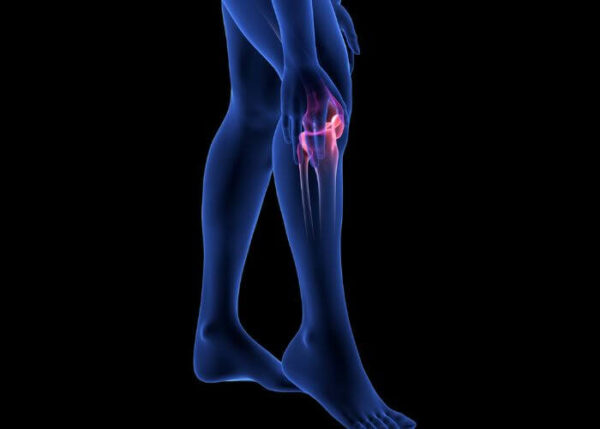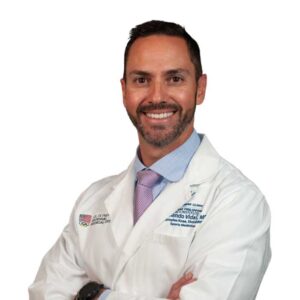What is the Articular Cartilage?
Articular cartilage is a complex, living tissue that lines the bony surface at the end of a joint. Its job is to make the bones glide smoothly against each other while moving or bearing weight. In children, articular cartilage injuries are usually caused from trauma or osteochondritis dissecans lesions (OCD). Whereas in adults, articular cartilage damage is often caused from mechanical degeneration (or wear and tear). Dr. Armando Vidal is a complex orthopedic knee specialist, serving patients in Vail, Aspen and the surrounding Denver, Colorado communities. He has extensive experience in articular cartilage injuries and how to treat both adults and children or adolescents.

What types of cartilage are in the body?
There are three different types of cartilage found in the human body:
- Articular Cartilage – also called hyaline cartilage, covers joint surfaces.
- Fibrocartilage – thicker cartilage that acts as a shock absorber, such as the meniscus in the knee or a vertebral disk in the spine.
- Elastic cartilage – contains elastic fiber networks and collagen type II fibers, such as the ear, larynx and epiglottis.
How is an articular cartilage injury different in children than in adults?
Articular cartilage injuries may be similar in both pediatrics and adults; however, children’s bodies are better equipped to heal a defective or injured cartilage. This is due to better intrinsic healing of cartilage in the child and generally improved biology. Adults do not enjoy the same biologic properties and therefore have a harder time healing. The mechanism of injury is also often different. In children articular cartilage injuries occur from a trauma and in adults it’s often from wear-and-tear and can be accompanied by osteoarthritis which makes the condition more difficult to treat.
What are the symptoms of articular cartilage damage in children?
Damage in adolescents that occurs after a fall, sports injury or other trauma often causes pain, stiffness, swelling and limited range of motion. Patients may feel like the knee is “giving out” or locking and catching.
How are children treated for an articular cartilage injury?
Dr. Armando Vidal prefers to treat pediatric sports injuries as conservatively as possible. Depending on the severity of the injury, he may recommend surgical or non-surgical treatments.
Non-Surgical Treatments:
- R.I.C.E – Rest, Ice, compression and elevation
- Discontinue the sport that caused the injury for a time
- Over the counter medication to alleviate pain may be suggested
- Physical therapy to strengthen the muscles around the knee joint.
- Unloader braces to help take stress off the injured area while it heals
Surgical Treatments:
Surgery for articular cartilage damage is reserved for the most severe of cases and often includes the repair of additional damage that occurred at the same time. Decision making in these cases is complex and requires vast experience in not just cartilage repair but associated procedures like meniscal transplant and osteotomy. Additionally, it requires experience and versatility with a variety of repair techniques – such as microfracture with biocartilage, MACI and osteochondral allografts. In these cases, and where appropriate, Dr. Vidal will use minimally invasive techniques to optimize outcome.
What is the recovery period for pediatric articular cartilage injuries?
Typically, a child is able to heal faster than an adult with this type of injury. However, an exact time-frame cannot be given until the injury is properly evaluated and treated. As a general rule, most adolescents with articular cartilage injuries that do not require surgery and are minimal in nature can heal in as little as a few weeks. If surgical intervention is needed and other structures in the knee require repair, recovery can take several months.
Pediatric Cartilage Surgeon
Has your child experienced a recent fall or injury during sports? If so, there is a chance your child has damaged their articular cartilage. Usually, this injury can be treated non-surgically. In more severe cases, though, it is advised to see an expert to receive corrective surgery. Pediatric cartilage restoration surgeon, Doctor Armando Vidal provides diagnosis as well as surgery using blended techniques for young patients in Vail, Aspen, and the surrounding Denver, Colorado communities who have experienced a cartilage injury. Contact Dr. Vidal’s team today!

Locations
180 S Frontage Rd W
Vail, CO 81657
226 Lusher Court
Ste 101
Frisco, CO 80443
322 Beard Creek Road
Edwards, CO 81632


